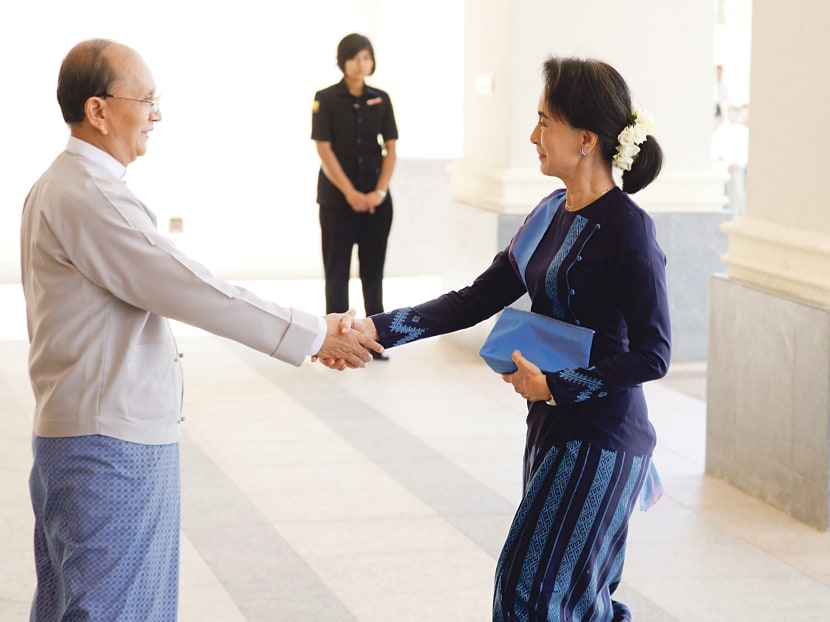Myanmar considers change to law barring Suu Kyi from presidency
NAYPYIDAW — Myanmar’s Parliament is to consider amending the country’s Constitution, which currently bars opposition leader Aung San Suu Kyi from becoming President, as part of political reforms ahead of the country’s key elections next year, Information Minister Ye Htut said yesterday.

Myanmar President Thein Sein (left) meeting opposition leader Aung San Suu Kyi at the Presidential Palace in Naypyidaw yesterday. Photo: AP
NAYPYIDAW — Myanmar’s Parliament is to consider amending the country’s Constitution, which currently bars opposition leader Aung San Suu Kyi from becoming President, as part of political reforms ahead of the country’s key elections next year, Information Minister Ye Htut said yesterday.
The move was announced following talks by Myanmar President Thein Sein yesterday, which for the first time brought together opposition leader Suu Kyi and the nation’s military chief, in a bid to showcase the nation’s political dialogue less than two weeks before United States President Barack Obama and other leaders attend a regional summit in the country.
Cracks in the fledgling democracy have widened ahead of the election, particularly over moves by Ms Suu Kyi’s National League for Democracy (NLD) party, backed by five million petitioners, to amend the Constitution and reduce the political clout of a military that ruled Myanmar brutally for 49 years.
The NLD has pushed unsuccessfully for the Constitution to be amended, so the lawmaker can run for presidency. Ms Suu Kyi cannot enter the race as her sons hold British citizenship.
At a press conference after the meeting yesterday, Mr Ye Htut said political leaders had discussed keeping the momentum on reforms and national reconciliation, and cooperating to make next year’s election free and fair.
He gave no details on how those aims would be achieved, but said an agreement had been reached to consider amending the Constitution in parliament within the framework of the law, AFP reported.
“The meeting was cordial and the participants exchanged their views very frankly,” he said. The participants have agreed to continue talks, but have yet to schedule their next meeting, he added.
Ms Suu Kyi, however, played down the significance of the talks, saying she would not call the meeting a success and would have preferred the talks to be more focused and involve a much smaller group.
After winning praise for helping steer the country from dictatorship to democracy since taking power in 2011 and convincing the West to suspend sanctions, Mr Thein Sein’s nominally civilian government is facing mounting criticism over the stalling of political reforms and peace talks with ethnic rebels.
Ms Suu Kyi has been calling for a meeting to discuss Myanmar’s political reforms for nearly a year but, until now, the Nobel Peace Prize laureate has been repeatedly rebuffed.
Next year’s election, however, will be the first general election that the NLD has contested since it won a 1990 vote that the military ignored. The party boycotted the last election in 2010 and Ms Suu Kyi was under house arrest then.
Critics, however, said yesterday’s meeting was little more than window dressing — a bid to show participants at a coming East Asia Summit that the country’s reforms are continuing.
Mr Obama on Thursday discussed his coming visit in separate conversations with Mr Thein Sein and Ms Suu Kyi. He underscored the need for an inclusive and credible process for conducting the election next year, the White House said.
He also stressed the importance of addressing tensions in Rakhine state, where more than 100,000 members of a Muslim minority had fled attacks and persecution over the past two years.
Mr Thein Sein yesterday met the opposition parties and ethnic minority groups at a roundtable meeting in Naypyidaw. The gathering also marked the first meeting between Ms Suu Kyi and powerful armed forces chief, Senior General Min Aung Hlaing.
Yesterday’s talks included a discussion on the prospects of a nationwide ceasefire with ethnic rebel groups. Peace talks with more than a dozen ethnic rebel groups stalled in September, dashing government hopes for an agreement. The political leaders agreed yesterday to work towards signing a nationwide ceasefire deal later this year or early next year.
Mr Obama has sought to present US backing of Myanmar’s reforms as a foreign policy success, but America has viewed developments in the country with growing concern, particularly over human rights abuses in Myanmar, including the jailing of journalists and alleged oppression of stateless Rohingya Muslims.
Violence erupted across Rakhine in 2012 between ethnic Rakhine Buddhists and Rohingya Muslims, killing at least 200 people and displacing 140,000, most of them Rohingya.
Meanwhile, the news of the meeting so close to Mr Obama’s arrival has been met with scepticism.
“It looks as if this is being timed for Obama’s visit, but this may be the start of what has been needed for a long time — an institutional framework for dialogue. There’s a lot that needs to be talked about and problems that will need solutions,” said Bangkok-based academic and Myanmar specialist Aung Thu Nyein.
Only six of Myanmar’s 70 political parties and a few ethnic groups were invited to the talks.
“The President will have to explain,” said Arakan National Party leader Aye Maung, the second-biggest ethnic party in parliament. The party is based in Rakhine state and was not invited. Agencies






